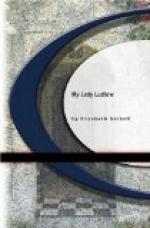“When I had heard all this story, I confess I lost in sympathy for Clement what I gained for his mother. Virginie’s life did not seem to me worth the risk that Clement’s would run. But when I saw him—sad, depressed, nay, hopeless—going about like one oppressed by a heavy dream which he cannot shake off; caring neither to eat, drink, nor sleep, yet bearing all with silent dignity, and even trying to force a poor, faint smile when he caught my anxious eyes; I turned round again, and wondered how Madame de Crequy could resist this mute pleading of her son’s altered appearance. As for my Lord Ludlow and Monkshaven, as soon as they understood the case, they were indignant that any mother should attempt to keep a son out of honourable danger; and it was honourable, and a clear duty (according to them) to try to save the life of a helpless orphan girl, his next of kin. None but a Frenchman, said my lord, would hold himself bound by an old woman’s whimsies and fears, even though she were his mother. As it was, he was chafing himself to death under the restraint. If he went, to be sure, the wretches might make an end of him, as they had done of many a fine fellow: but my lord would take heavy odds, that, instead of being guillotined, he would save the girl, and bring her safe to England, just desperately in love with her preserver, and then we would have a jolly wedding down at Monkshaven. My lord repeated his opinion so often that it became a certain prophecy in his mind of what was to take place; and, one day seeing Clement look even paler and thinner than he had ever done before, he sent a message to Madame de Crequy, requesting permission to speak to her in private.
“‘For, by George!’ said he, ’she shall hear my opinion, and not let that lad of hers kill himself by fretting. He’s too good for that, if he had been an English lad, he would have been off to his sweetheart long before this, without saying with your leave or by your leave; but being a Frenchman, he is all for AEneas and filial piety,—filial fiddle-sticks!’ (My lord had run away to sea, when a boy, against his father’s consent, I am sorry to say; and, as all had ended well, and he had come back to find both his parents alive, I do not think he was ever as much aware of his fault as he might have been under other circumstances.) ‘No, my lady,’ he went on, ’don’t come with me. A woman can manage a man best when he has a fit of obstinacy, and a man can persuade a woman out of her tantrums, when all her own sex, the whole army of them, would fail. Allow me to go alone to my tete-a-tete with madame.”
“What he said, what passed, he never could repeat; but he came back graver than he went. However, the point was gained; Madame de Crequy withdrew her prohibition, and had given him leave to tell Clement as much.
“‘But she is an old Cassandra,’ said he. ’Don’t let the lad be much with her; her talk would destroy the courage of the bravest man; she is so given over to superstition.’ Something that she had said had touched a chord in my lord’s nature which he inherited from his Scotch ancestors. Long afterwards, I heard what this was. Medlicott told me.




